- Home
- William Styron
A Tidewater Morning Page 6
A Tidewater Morning Read online
Page 6
Trixie began to anticipate Mr. Dabney’s fury and resentment even before he erupted. “Shoog, keep yourself calm—”
“Bat shit! It is an outraged!” he roared. “Since when did a taxpaying citizen have to answer to the gov’ment in order to bury a harmless sick old colored man on his own property! It goes against every bill of rights I ever heard of—”
“Shoog!” Trixie put in. “Please—” She began to wail.
The sheriff put out placating hands and loudly commanded: “Quiet!“ Then when Mr. Dabney and Trixie fell silent he went on: “Vern, me an’ you have been acquainted for a long time, so please don’t give me no trouble. I’m tellin’ you for the last time, this. Namely, you have got to arrange to get that old man buried at one of the colored churches around here, and you will also have to have him taken care of by a licensed undertaker. You can have your choice. There’s a wellknown colored undertaker in Tappahannock and also I heard of one over in Middlesex, somewhere near Urbanna or Saluda. If you want, I’ll give them a telephone call from the courthouse.”
I watched as the red rage in Mr. Dabney’s face was overtaken by a paler, softer hue of resignation. After a brooding long silence, he said: “A11 right then. All right! How much you reckon it’ll cost?”
“I don’t know exactly, Vern, but there was an old washerwoman worked for me and Ruby died not long ago, and I heard they buried her for thirty-five dollars.”
“Thirty-five dollars!” I heard Mr. Dabney breathe. “Christ have mercy!”
Perhaps it was only his rage that caused him to flee, but all afternoon Mr. Dabney was gone and we did not see him again until that evening. Meanwhile, Shadrach rallied for a time from his deep slumber, so taking us by surprise that we thought he might revive completely. Trixie was shelling peas and sipping beer while she watched Little Mole and me at our marbles game. Suddenly Edmonia, who had been assigned to tend to Shadrach for an hour, came running from the house. “Come here, you all, real quick!” she said in a voice out of breath. “Shadrach’s wide awake and talking!” And he was: when we rushed to his side we saw that he had hiked himself up in bed, and his face for the first time in many hours wore an alert and knowing expression, as if he were at least partially aware of his surroundings. He had even regained his appetite. Edmonia had put a daisy in the buttonhole of his shirt, and at some point during his amazing resurrection, she said, he had eaten part of it.
“You should have heard him just now,” Edmonia said, leaning over the bed. “He kept talking about going to the millpond. What do you think he meant?”
“Well, could be he just wants to go see the millpond,” Trixie replied. She had brought Shadrach a bottle of RC Cola from the kitchen and now she sat beside him, helping him to drink it through a paper straw. “Shad,” she asked in a soft voice, “is that what you want? You want to go see the millpond?”
A look of anticipation and pleasure spread over the black face and possessed those old rheumy eyes. And his voice was high-pitched but strong when he turned his head to Trixie and said: “Yes, ma’am, I does. I wants to see de millpond.”
“How come you want to see the millpond?” Trixie said gently.
Shadrach offered no explanation, merely said again: “I wants to see de millpond.”
And so, in obedience to a wish whose reason we were unable to plumb but could not help honoring, we took Shadrach to see the millpond. It lay in the woods several hundred yards to the east of the house—an ageless murky dammed-up pool bordered on one side by a glade of moss and fern, spectacularly green, and surrounded on all its other sides by towering oaks and elms. Fed by springs and by the same swiftly rushing stream in which the other children had gone fishing, its water mirrored the overhanging trees and the changing sky and was a pleasurable ordeal to swim in, possessing the icy cold that shocks a body to its bones. For a while we could not figure out how to transport Shadrach down to the place; it plainly would not do to let him try to hobble that long distance, propelled, with our clumsy help, on his nearly strengthless legs in their dangling gait. Finally someone thought of the wheelbarrow, which Mr. Dabney used to haul corn to the still. It was fetched from its shed, and we quickly made of it a not unhandsome and passably comfortable sort of a wheeled litter, filling it with hay and placing a blanket on top.
On this mound Shadrach rested easily, with a look of composure, as we moved him gently rocking down the path. I watched him on the way: in my memory he still appears to be a half-blind but self-possessed and serene African potentate being borne in the fullness of his many years to some longed-for, inevitable reward.
We set the wheelbarrow down on the mossy bank, and there for a long time Shadrach gazed at the millpond, alive with its skating waterbugs and trembling beneath a copper-colored haze of sunlight where small dragonflies swooped in nervous filmy iridescence. Standing next to the wheelbarrow, out of which the shanks of Shadrach’s skinny legs protruded like fragile black reeds, I turned and stared into the ancient face, trying to determine what it was he beheld now that created such a look of wistfulness and repose. His eyes began to follow the Dabney children, who had stripped to their underdrawers and had plunged into the water. That seemed to be an answer, and in a bright gleam I was certain that Shadrach had once swum here too, during some unimaginable August nearly a hundred years before.
I had no way of knowing that if his long and solitary journey from the Deep South had been a quest to find this millpond and for a recaptured glimpse of childhood, it might just as readily have been a final turning of his back on a life of suffering. Even now I cannot say for certain, but I have always had to assume that the still-young Shadrach who was emancipated in Alabama those many years ago was set loose, like most of his brothers and sisters, into another slavery perhaps more excruciating than the sanctioned bondage. The chronicle has already been a thousand times told of those people liberated into their new and incomprehensible nightmare: of their poverty and hunger and humiliation, of the crosses burning in the night, the random butchery, and, above all, the unending dread. None of that madness and mayhem belongs in this story, but without at least a reminder of these things I would not be faithful to Shadrach. Despite the immense cheerfulness with which he had spoken to us of being “dibested of mah plenty,” he must have endured unutterable adversity. Yet his return to Virginia, I can now see, was out of no longing for the former bondage, but to find an earlier innocence. And as a small boy at the edge of the millpond I saw Shadrach not as one who had fled darkness, but as one who had searched for light refracted within a flashing moment of remembered childhood. As Shadrach’s old clouded eyes gazed at the millpond with its plunging and calling children, his face was suffused with an immeasurable calm and sweetness, and I sensed that he had recaptured perhaps the one pure, untroubled moment in his life. “Shad, did you go swimming here too?” I said. But there was no answer. And it was not long before he was drowsing again; his head fell to the side and we rolled him back to the house in the wheelbarrow.
On Saturday nights in the country the Dabneys usually went to bed as late as ten o’clock. That evening Mr. Dabney returned at suppertime, still sullen and fretful but saying little, still plainly distraught and sick over the sheriff’s mandate. He did not himself even pick up a fork. But the supper was one of those ample and blessed meals of Trixie’s I recall so well. Only the bounty of a place like the Tidewater backcountry could provide such a feast for poor people in those hardpressed years: ham with red-eye gravy, grits, collard greens, okra, sweet corn, huge red tomatoes oozing juice in a salad with onions and herbs and vinegar. For dessert there was a delectable bread pudding drowned in fresh cream. Afterward, a farmer and bootlegging colleague from down the road named Mr. Seddon R. Washington arrived in a broken-down pickup truck to join with Mr. Dabney at the only pastime I ever saw him engage in—a game of dominoes. Twilight fell and the oil lanterns were lit. Little Mole and I went back like dull slugs to our obsessive sport, scratching a large circle in the dust beside the porch and crouching
down with our crystals and agates in a moth-crazed oblong of lantern light, tiger-yellow and flickering. A full moon rose slowly out of the edge of the woods like an immense, bright, faintly smudged balloon. The clicking of our marbles alternated with the click-click of the dominoes on the porch bench.
“If you wish to know the plain and simple truth about whose fault it is,” I heard Mr. Dabney explain to Mr. Washington, “you can say it is the fault of your Franklin D-for-Disaster Roosevelt. The Dutchman millionaire. And his so-called New Deal ain’t worth diddley squat. You know how much I made last year—legal, that is?”
“How much?” said Mr. Washington.
“I can’t even tell you. It would shame me. They are colored people sellin’ deviled crabs for five cents apiece on the streets in Newport News made more than me. There is an injustice somewhere with this system.” He paused. “Eleanor’s near about as bad as he is.” Another pause. “They say she fools around with colored men and Jews. Preachers mainly.”
“Things bound to get better,” Mr. Washington said.
“They can’t get no worse,” said Mr. Dabney. “I can’t get a job anywhere. I’m unqualified. I’m only qualified for making whiskey.”
Footsteps made a soft slow padding sound across the porch and I looked up and saw Edmonia draw near her father. She parted her lips, hesitated for a moment, then said: “Daddy, I think Shadrach has passed away.”
Mr. Dabney said nothing, attending to the dominoes with his expression of pinched, absorbed desperation and muffled wrath. Edmonia put her hand lightly on his shoulder. “Daddy, did you hear what I said?”
“I heard.”
“I was sitting next to him, holding his hand, and then all of a sudden his head—it just sort of rolled over and he was still and not breathing. And his hand—it just got limp and—well, what I mean, cold.” She paused again. “He never made a sound.”
Mr. Washington rose with a cough and walked to the far edge of the porch, where he lit a pipe and gazed up at the blazing moon. When again Mr. Dabney made no response, Edmonia lightly stroked the edge of his shoulder and said gently: “Daddy, I’m afraid.”
“What’re you afraid about?” he replied.
“I don’t know,” she said with a tremor. “Dying. It scares me. I don’t know what it means—death. I never saw anyone—like that before.”
“Death ain’t nothin’ to be afraid about,” he blurted in a quick, choked voice. “It’s life that’s fearsome! Life Suddenly he arose from the bench, scattering dominoes to the floor, and when he roared “Life!” again, I saw Trixie emerge from the black hollow of the front door and approach with footfalls that sent a shudder through the porch timbers. “Now, Shoog—” she began.
“Life is where you’ve got to be terrified!” he cried as the unplugged rage spilled forth. “Sometimes I understand why men commit suicide! Where in the goddamned hell am I goin’ to get the money to put him in the ground? Niggers have always been the biggest problem! Goddamnit, I was brought up to have a certain respect and say ‘colored’ instead of ‘niggers’ but they are always a problem. They will always just drag you down! I ain’t got thirty-five-dollars! I ain’t got twenty-five dollars! I ain’t got five dollars!”
“Vernon!” Trixie’s voice rose, and she entreatingly spread out her great creamy arms. “Someday you’re goin’ to get a stroke!”
“And one other thing!” He stopped.
Then suddenly his fury—or the harsher, wilder part of it—seemed to evaporate, sucked up into the moonlit night with its soft summery cricketing sounds and its scent of warm loam and honeysuckle. For an instant he looked shrunken, runtier than ever, so light and frail that he might blow away like a leaf, and he ran a nervous, trembling hand through his shock of tangled black hair. “I know, I know,” he said in a faint, unsteady voice edged with grief. “Poor old man, he couldn’t help it. He was a decent, pitiful old thing, probably never done anybody the slightest harm. I ain’t got a thing in the world against Shadrach. Poor old man.”
Crouching below the porch I felt an abrupt, smothering misery. The tenderest gust of wind blew from the woods and I shivered at its touch on my cheek, mourning for Shadrach and Mr. Dabney, and slavery and destitution, and all the human discord swirling around me in a time and place I could not understand. As if to banish my fierce unease, I began to try—in a seizure of concentration—to count the fireflies sparkling in the night air. Eighteen, nineteen, twenty …
“And anyway,” Trixie said, touching her husband’s hand, “he died on Dabney ground like he wanted to. Even if he’s got to be put away in a strange graveyard.”
“Well, he won’t know the difference,” said Mr. Dabney. “When you’re dead nobody knows the difference. Death ain’t much.”
A TIDEWATER MORNING
During the late summer of 1938, there was black news of the onrushing war. I had just turned thirteen, and I had a newspaper route that carried me on foot up and down the hot, sycamore-lined streets of our little village on the banks of the James River in Tidewater Virginia. I folded the papers into cylinders, forty-five or fifty of them, and stuffed them into a dingy white canvas bag that I lugged around with a strap that at first cut painfully into my shoulder, then eased up about a third of the way through my afternoon trek, which took about an hour and a half. The banner headlines that summer were tall and thick with harsh alarm: HITLER THREATENS. GERMAN TROOPS MASSING. CZECHOSLOVAKIA menaced. The news caused me less fear, really, than a vague, visceral excitement, distracting me from the gloom that encompassed me, from the ache that swelled in my stomach whenever I thought of my mother and her illness. And that thought always returned with a queasy jolt. I was also nagged by a worry having to do with my body: my nipples had become exquisitely tender, sensitive to the touch of the inside of my shirt and to my nervous, examining fingers, and the horrible fantasy flashed off and on in my mind that I might be turning, at least partially, into a girl. I fretted over other matters—over the length and tedium of the paper route, which I had commenced in the jazzed-up high spirits of anyone at his first paid professional employment but which had now lost most of its savor, and over my pay: $2.50 a week for nine hours, including an extra tour of duty overloaded at dawn with the fat editions of Sunday. Even during the Depression this was paltry recompense, and it was doled out dime by dime, nickel by nickel, by the only consummately mean-spirited person among the many frail and imperfect characters who floated in and out of my early youth.
Mr. Quigley—I have forgotten or blanked out his first name—was the proprietor of Quigley’s Store, an all-purpose emporium that stood on a barren tract of land just east of the village. It was a squat, nondescript place made of brick painted a bleached blue with a squeaking screen door and two windows nearly opaque with dust where one neon sign, reading pabst blue ribbon, pulsed spiritlessly, and the other, reading schlitz, was permanently dark. I imagine that if one could smell a Hogarth drawing, it would smell of gin; the interior of Quigley’s Store, Hogarthian in its dim clutter and squalor, smelled of spilled beer, cigarette smoke, and unwashed floors. After four o'clock a flock of shipyard workers gathered there every weekday afternoon to knock down bottles of beer at the round metal-topped tables in the rear of the store; they were a sullen lot, mostly displaced North Carolinians who had come to the area to make a few desperately needed shipyard dollars, and they lolled around in near-silence in the murk, chewing on pickled pigs' feet from a rotund two-gallon jar and munching on pretzels. Up front was a magazine stand with its ranks of comic books, True Detectives, and Police Gazettes. Next to this sat a grimy soda fountain, seldom used, and a display case of candy bars where I could always see the halfdozen resident flies making their perpendicular strolls on the glass inside. There were two pinball machines whose bunk bong ding, ding bunk bong was a constant background monotone. After the five miles of my paper route I was invariably sweat-soaked and nearly faint with thirst. So, together with the two or three other boys straggling in, I would head straight for the red ena
mel storage chest where, alongside the beer, the Coca-Colas were kept, and the Nehi and the Orange Crush and the Hires root beer. No stately automated dispensers in those days, no color-coordinated sevenfoot-tall designer model popping out its temperature-regulated frosted can into the dry and welcoming palm. One went instead to the case where the bottles stood in water cooled by ice, withdrew a Coca-Cola or a Dr Pepper refreshingly damp between one’s fingers. In all civilized establishments the water was changed regularly; at Quigley’s the water stagnated week in and week out, and the malodorous bottle, withdrawn, was slimy to the touch. Whenever I would hurry to the case and open the top, Mr. Quigley would be waiting with his smudged and tattered notebook, pencil poised.
“What are you having, Whitehurst?” he would ask. In those stuffier times businessmen were often on a last-name basis with their employees, but though I was a boy, it would have taken someone less rigidly uncharitable than Mr. Quigley to call me Paul. I hated the stingy bastard.
“I’m having a root beer,” I would reply.
And I’d watch him as he’d scratch my name in his notebook, or indite some intricate cross-reference or computation, and dock me five cents. Mr. Quigley’s ethnicity was somewhat odd for a native Virginian; it was said that his mother was Greek. He was a swarthy, pinched-face little man with a pronounced curvature of the spine that twisted him slightly sideways and gave him a limp. Was it this handicap, producing some inner misery of spirit—I occasionally wondered later (having become less uncharitable myself)—that disposed him to his lack of generosity? I was not so impractical or dumb about finance, especially at that time, when a dollar was worth a dollar, to begrudge Mr. Quigley his concern about the attrition that many unaccounted-for Coca-Colas or Hershey bars would produce against his profits. I did resent, though, the absence in him of any hint of humor or benevolence—for I was still enough of a child to expect the preferential decency, at least, that a child is supposed to receive—and I resented most of all that never once (never once, never once, I would mutter to myself as I slogged across the lawns deep in garden-hose damp and dog shit) did he offer me a small treat, gratis. Not a candy bar, not a bag of potato chips, nor even the pack of peanut butter crackers (“Nibble a NAB for a Nickel”) I would snatch off its filthy shelf when, some Friday evening, my stomach growled with unpropitiated hunger. He would be waiting. Down would go Mr. Quigley’s pencil in his notebook, marking my tiny debit, and as I glanced up at the pinched, small, satisfied face I made a rapid calculation and realized that on this payday I’d take home less than half my salary, or around $1.15.

 Selected Letters of William Styron
Selected Letters of William Styron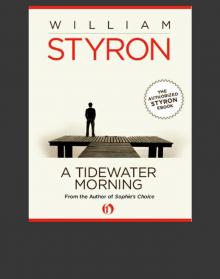 A Tidewater Morning
A Tidewater Morning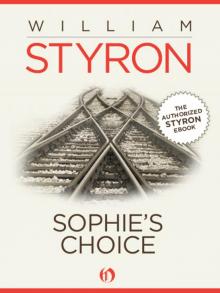 Sophie's Choice
Sophie's Choice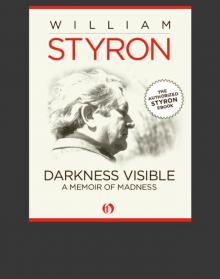 Darkness Visible: A Memoir of Madness
Darkness Visible: A Memoir of Madness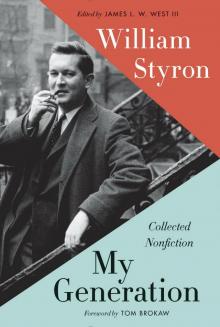 My Generation: Collected Nonfiction
My Generation: Collected Nonfiction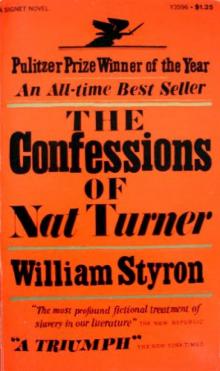 The Confessions of Nat Turner
The Confessions of Nat Turner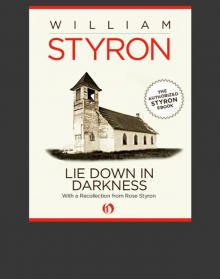 Lie Down in Darkness
Lie Down in Darkness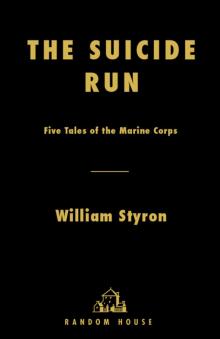 The Suicide Run: Five Tales of the Marine Corps
The Suicide Run: Five Tales of the Marine Corps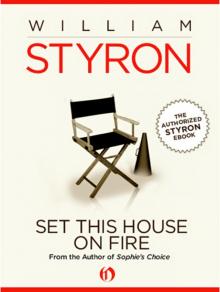 Set This House on Fire
Set This House on Fire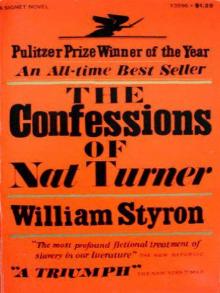 Confessions of Nat Turner
Confessions of Nat Turner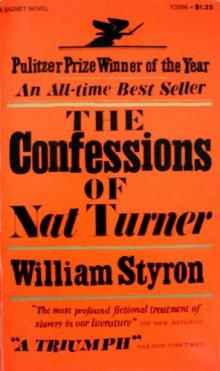 The Confessions of Nat Turner (1968 Pulitzer Prize)
The Confessions of Nat Turner (1968 Pulitzer Prize)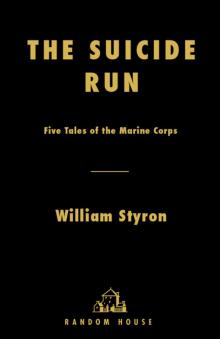 The Suicide Run
The Suicide Run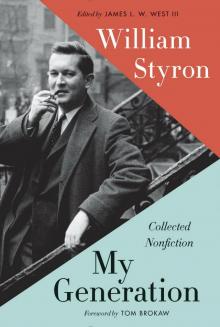 My Generation
My Generation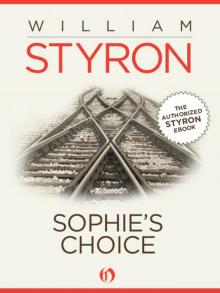 Sophie's Choice (Open Road)
Sophie's Choice (Open Road)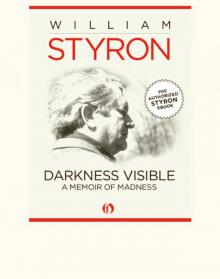 Darkness Visible
Darkness Visible